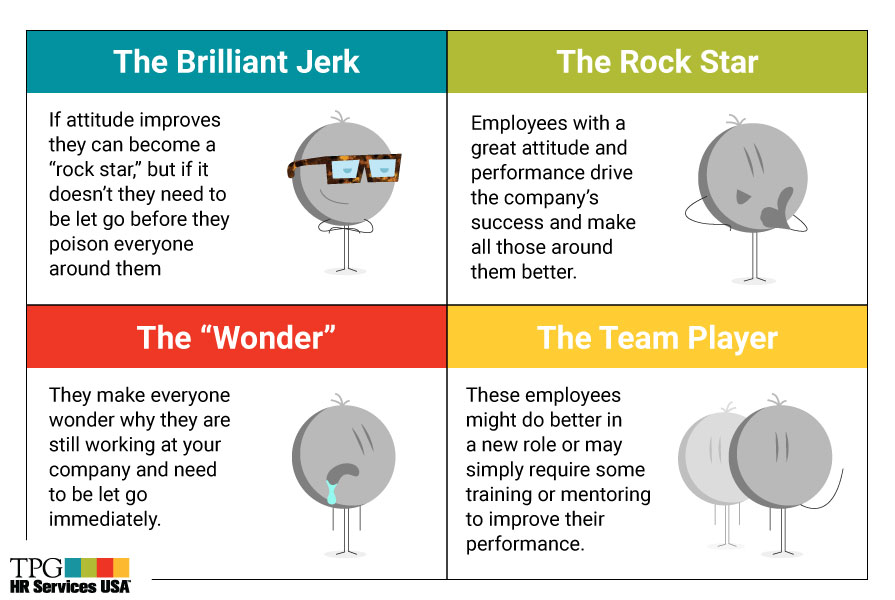
How to Handle a Good Employee with a Bad Attitude

Ms. Pomerantz is the CEO of TPG HR Services USA and has over 35 years of Human Resources practices experience. She holds a Master’s in Human Resource Management (MHRM) and is a certified Senior Professional in Human Resources (SPHR) and SHRM Senior Certified Professional (SHRM-SCP). Mary also serves as CEO of Mary Pomerantz Advertising, one of the largest recruitment advertising agencies in the country. Earlier in her career, she was president of the 17th largest staffing firm in the country.

If you have an underperforming employee who has a toxic attitude that is contaminating the rest of your staff, the solution is simple: find a replacement and fire him. But if that employee is one of your best workers, firing him may not be the best approach if you want to maintain your team’s productivity and amazing results. In many cases, a good employee’s bad attitude may be overlooked by managers because of his performance, but that is unfair to the rest of your staff and will likely harm your company in the end. Here are some ideas to help you manage a good employee with a bad attitude.
Examine the Impact of the Employee’s Behavior
Employees complain about their employers. This is the natural order of things, so you want to be careful not to overreact immediately. Before taking any action at all, you should think about what effect, if any, your employee’s behavior is having. A worker complaining about an increased workload or being overlooked for a promotion is not abnormal and may not warrant any serious action other than a private conversation. Before handing out any employee discipline, ask yourself the following questions:
- Are the employee’s complaints legitimate?
If your good employee’s bad attitude stems from a real issue, it may be more understandable and easily remedied. - Is the employee’s attitude bleeding into the rest of the staff?
While you certainly don’t want even one of your workers to be unhappy or have a bad attitude, it’s most important to see how it’s affecting the rest of your staff. Is this a contained problem or is it spreading?

- Is the employee undermining your authority?
It’s one thing to have a comment every now and then about the way the boss is handling things, it’s completely different when this criticism is ongoing and causes others to question your competence.
Immediately Address the Negative Behavior
One of the more common errors managers and business owners make when dealing with star employees who have bad attitudes is ignoring the negative behavior. Often, the thinking is that, if it isn’t affecting performance, why bother saying anything? The problem with this approach is that it emboldens the problem employee to believe he or she can do anything without fear of consequence as long as his or her productivity does not drop.
It’s important that your problem employee recognizes that bad behavior is a performance issue, regardless of how productive they believe they are.
Once you notice that an employee’s behavior is negative, unwarranted, affecting the staff and/or undermining your authority, you need to address it quickly. Most often, a private sit-down conversation is sufficient at this stage. Keep the following tips in mind:
6 Step Behavioral Action Plan
- Be specific about the behavior: Don’t just say “I don’t like your attitude.” Point out exactly what they are doing and how it’s negatively impacting the company.
- Keep it results-oriented: It’s important that your problem employee recognizes that bad behavior is a performance issue, regardless of how productive they believe they are.
- Let your employee respond: It’s highly likely that your “bad apple” employee will have a different opinion about his behavior and/or its impact than you. Be sure to allow him or her to speak freely.
- Explain the consequences of inaction: Your employee needs to know that you mean business. Let him or her know that there will be consequences if the negative behavior continues and outline what exactly could happen.
- Put it in writing: It’s critical that you document the entire meeting. This will give you a paper trail should you decide to terminate the employee in the future.
- Follow-through: Don’t threaten a punishment that you aren’t prepared to carry out. This will only embolden your problem employee and make you look weak to the rest of the staff.
Setting an Example for Other Employees
Whenever you are dealing with an issue with a single employee, it is critical to remember that the way in which you are handling that issue is serving as an example to all of your other employees. Even in situations where you believe you are addressing something in confidence, outside of the spotlight, other employees on your staff are likely to find out about the results, even if only partially (and perhaps incorrectly) “through the grapevine” that exists at any company. That is why it is so important to tackle the issue of an otherwise good employee’s bad attitude in the appropriate way. When dealing with that employee you are also sending a message to all employees about fairness and standards that apply to everyone at the company, regardless of their status or expertise.

In the long run how you handle this issue regarding one employee will help to set the tone for everyone’s expected behavior and attitude, moving forward. And, this organization-wide impact is likely to be greater than the immediate impact of how you specifically choose to address a single employee’s problematic attitude. Setting a tone of consistency and fairness across the board will ultimately yield the best results in terms of productivity and morale for your entire workforce.
Correcting the Attitude of a High-Performer Sends the Strongest Message
At many companies employees may have the, spoken or unspoken, assumption that high-performing employees operate under a different set of rules than the rest of the staff. Whether this assumption has a basis in fact or not is often not even relevant to the existence of these kinds of preconceived beliefs. In fact, it is safe to assume that at least some of the staff at your company hold this opinion, no matter how fair or consistent your company’s policies are implemented. That’s why holding an otherwise high-performing employee accountable for their problematic attitude can actually send an even stronger message about fairness and consistency to all of your employees than you might think. When employees see that even those they might perceive as “the chosen few” are held to the same standards and expectations as the rest of the staff, it can help to dramatically shape their opinions on the entire company’s operations in a very positive way, providing much more “bang for the buck” than discipline or consequences meted out to an “average” member of your staff.

“Brilliant Jerks” Can Sabotage Your Success
According to Kirk Dando – a successful author, business mentor, and former CEO of a billion-dollar company, high-performing employees with bad attitudes can torpedo the success of any organization. Described by him as “brilliant jerks,” these individuals often have a “me-first” attitude that greatly inhibits the growth and achievement of all of the team members around them. Although it may seem like these individuals are invaluable to the company, when they are eventually let go after refusing to improve their attitudes – the performance and attitudes of those around them often improve almost immediately to fill the vacuum created by their leaving. Dando describes the atmosphere immediately after a “brilliant jerk” is let go in the following way:
The Performance/Attitude Employee Matrix

Strong Employee Communication is Essential
We aren’t robots. Sometimes a little communication is necessary to make sure everyone is on the same page and that everyone is happy and pulling their weight at your company. Dealing with a good employee with a bad attitude is just one example of a situation where effective employee communication is critical to a successful business.
“It’s easier to have honest conversations. Employees will be happier. It’s a better work environment. Even better, you’ll see it in the financial results, customer satisfaction and, heck, you’ll probably see it in your own self-satisfaction.”
Dando
But, for most business owners, it’s not easy to have productive conversations with workers. You may have too many employees or simply not enough time in the day to address these issues as they arise. You may also just not excel at this type of communication, which is common and completely understandable.

This is one of the reasons that partnering with an external HR provider makes sense for many businesses. You have endless responsibilities to worry about at your business; let the professionals at TPG HR Services USA worry about your employee communications and relations while you take care of everything else at your business. Learn more about how we can help by calling 732-917-6000.
